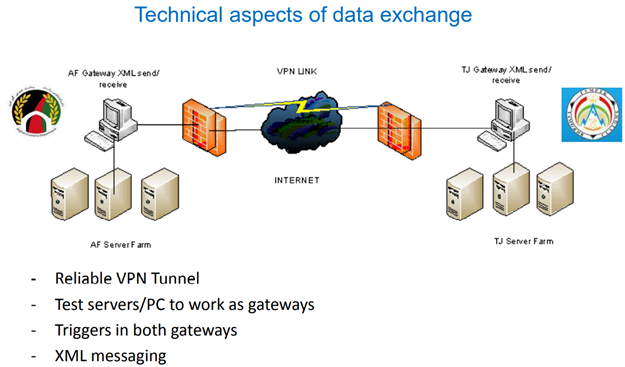A. General Information
1. Title
Customs data exchange between Tajikistan and Afghanistan
2. Status of the project
Terminated
3. Implementation period of the project/service:
5. Geographical coverage
Bilateral
Participating countries: Afghanistan, Tajikistan
6. Participating agencies/entities of the project/service:
a. Development stage
Lead agencies/entities
UNCTAD UN Economic Commission for Europe The World Bank
Other participating agencies/entities
--
b. Operational stage
Lead agencies/entities (op)
UNCTAD, UN Economic Commission for Europe ,The World Bank
Other participating agencies/entities (op)
--
7. Main stakeholders/beneficiaries of the project
Traders (big enterprises)
Traders (SMEs)
Customs brokers
Customs
8. Business process category of the project
Regulatory/official control
B. Lessons Learned
9. Summary description of the project/service
Brief Summary
Institutionalization of an automated, efficient and harmonized exchange of Customs data between Afghanistan and the neighboring SPECA countries, and the creation of secure transit corridors facilitating the trade in the region.


a. Objective(s)
The exchange of Customs data between the neighboring Customs Administrations (C2C, Customs to Customs) plays an important role in facilitating regional transit/legitimate trade, combating smuggling and drugs trafficking, and solving other topical problems.The outputs of the current Customs Modernization Project in Afghanistan, assisted by UNCTAD, can multiplied through establishing efficient Customs data exchange between Afghanistan and Tajikistan, where serious work has been done on developing a Single Window solution for trade facilitation and streamlining trade procedures.
Using the declared intention of the two countries to work on these issues, the project was launched to electronic exchange customs data between customs administration of Tajikistan and Afghanistan aimed at effective implementation of secure transit corridors, facilitation of legitimate trade, higher quality advance information exchange and better risk management.
b. Business need for the project (background)
To control high volume cross border operations, to better manage risks, effectively exchange reliable information.
c. Business process covered*
The organization of data exchange in real time
Ensuring interoperability of information systems of UAIS and ASYCUDAWorld
The use of modern IT solutions (XML messages, web services)
Harmonization of data exchanged formats in accordance with international standards
Full consideration of information security and privacy.
d. Overall architecture and functionalities*
e. Relevant document/figure
--
10. Documents and data exchanged via the project
Exchange of customs data (Import/Export, transit, enforcement)
11. Data models/databases, proprietary solutions, hybrid approaches
--
12. Main challenges faced during the project
--
13. Lessons learned from the project
--
14. Main benefit(s) of the project
Enhanced regulatory compliance*
Transaction Cost savings*
Transaction Time savings
Simplified process
14A. Elaborations/detailed description on benefits gained
Improved Control
Trade facilitation and supply chain security
Better environment for regional transit
Formation of Regional transit corridor
Gradual involvement of other agencies to cross border data exchange in the Single Window format
15. Technical/financial/capacity building/other assistance
The project was conducted with the assistance of the WB.
16. Future plan for expansion of the project
Involvement of other countries in the region to the project (Pakistan, Iran)
Formation of regional transit corridors
Promote regional integration
17. Other information or relevant references on the project
--
18. Relevant document regarding the project
--
C. Relevant Standards
19. Name(s) of any international, national legal instrument underpinning the project
Bilateral agreement on cooperation and mutual assistance in customs matters.
20. Electronic message standard
20A. Electronic message standard supporting the project
20B. Type of standard for electronic message applied for the project
Technical recommendations from international body(ies)
21. Technical communication standard
21A. Technical communication standard supporting the project
--
21B. Type of technical communication standard applied for the project
--
22. Security-related standards*
22A. Security-related standard supporting the project
VPN (Virtual Private Network)
22B. Type of security-related standard applied for the project
Technical recommendations from international body(ies)
23. Other Technical Information
23A. Interface developed for data exchange with an internal system
--
23B. Other technical implementation information
--


